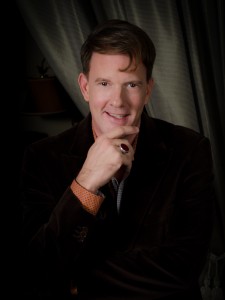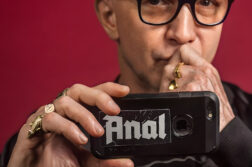“You a bitch or whore?” asks Jamie Brickhouse with a mischievous grin from across the lacquered coffee table in his trendy  Chelsea flat in New York City. With his copper hair, black sweater, purple shirt, and indigo plaid trousers, it’s clear the author of the new book Dangerous When Wet (St. Martin’s Press) is accustomed to colorful accents, both on and off the page. As he pours from the silver teapot, curlicues of steam spill out of two china cups, each rimmed with broad bands of emerald and emblazoned with campy epithets. With his back against a velour throw, a zebra-patterned pillow under one arm, and his tabby Lotte Lenya at his side, we begin our interview about the native Texan’s first book, a campy yet touching memoir about his struggles with the bottle, his sexuality, and his mother, Mama Jean.
Chelsea flat in New York City. With his copper hair, black sweater, purple shirt, and indigo plaid trousers, it’s clear the author of the new book Dangerous When Wet (St. Martin’s Press) is accustomed to colorful accents, both on and off the page. As he pours from the silver teapot, curlicues of steam spill out of two china cups, each rimmed with broad bands of emerald and emblazoned with campy epithets. With his back against a velour throw, a zebra-patterned pillow under one arm, and his tabby Lotte Lenya at his side, we begin our interview about the native Texan’s first book, a campy yet touching memoir about his struggles with the bottle, his sexuality, and his mother, Mama Jean.
Court Stroud: Was it difficult for you to write so candidly about the three great loves of your life: booze, sex, and your mother?
Jamie Brickhouse: Actually, I don’t love booze anymore. But my mother—I think about her every day. Was it hard? Sure, it’s revealing my own bad behavior. I had to come to terms with whether I was going to tell everything. With the alcohol side of things, I wasn’t so nervous. I had been sober for some time so that wasn’t such a hurdle. Talking about my mother, though? For a while, I felt I might be betraying her.
CS: Was there any pushback from family members?
JB: No, there wasn’t. My family was very supportive about the book. My father gave me carte blanche. But I had to overcome my fear that I might betray her by writing about our relationship or her behavior. The last hurdle was revealing that I’m HIV-positive, because I was still in the closet about that.
CS: In the book, you mention your mother died not knowing your status.
JB: I never told her because I wanted to protect her. I was also, quite frankly, afraid that she’d say: “Goddammit! I told you so! I knew this would happen to you!” However, even if she’d had that reaction at first, she would’ve gotten over it.
CS: You struggled about whether to put your HIV status in the book?
JB: I had shame about it. I don’t, for the most part, now. Although I didn’t write this book as a form of therapy, it’s helped me come to terms with being HIV-positive. It’s a disease, a condition, like any other. I decided, in the end, it’s crucial as a consequence of my drinking.
CS: If you didn’t write the book as a form of therapy, why did you write Dangerous When Wet?
JB: Because I wanted to be a writer. I wrote from the time I was young. I wrote in high school. I wrote in college. I’ve always wanted to express myself artistically—and this was a story I had to tell. I started writing it in a workshop a year after my mother died knowing that I wanted to tell this story. In other words, I had the fire in me to write this because I had to.
CS: Your mother tells you to be a writer during your freshman year of college. Why did you wait so long to write your first book?
JB: I did do some early writing. When I came to New York, I wanted to work for magazines, got into book publishing instead, did some freelancing for a while. Then the drinking took over. I was a functioning alcoholic for a long time, so I kept my job and I kept moving up in the publishing world. I even made the decision that I didn’t have time for any other artistic endeavor because I was busy working and out living my life. I didn’t say, “out drinking”; it was “out living my life.”
CS: At the age of five, you watched Peggy Lee sing “Is That All There Is?” on TV and it became your song. Why the instant attraction?
JB: She was unlike anything I’d ever seen before on television. She was this large, ghostly, sparkly, freaky image in a fog of lights and white chiffon. Her appearance drew me in. Then, the song itself is this great story. I related immediately to the melancholy of it and to the acceptance of disappointment. If crap comes your way in life, let’s just have a party and keep moving.
CS: Now that you’re sober, do you still have the desire to “break out the booze and have a ball”?
JB: I still like to have a good time. But I don’t throw myself into a party, i.e. drinking, to get over life’s disappointments. These days, for the most part, I face them head on. Some alcoholics say that from the beginning they drank to avoid reality, but I started drinking because I like to have fun and drinking got me there faster.
CS: My heart went out to you several times when you related how you’d go out for a drink after work and then you’d realize the sun was dawning on the next workday. This account must have been painful to write.
JB: I’m glad you said it was painful to read, because then I’ve done my job of telling the story, which was painful to live. The guilt and shame were the worst part—worse than the physical hangovers, worse than the money spent and the money lost. Worse than any of it was the self-loathing that it caused.
CS: You’re unflinchingly honest in your storytelling. When you describe how the anal warts you picked up while still in high school looked like “a cauliflower bouquet,” I wanted to laugh but was so horrified that a fifteen-year-old had to go through such embarrassment. Have you overcome your shame?
JB: I have. As for the STDs, I never had crabs and never had the clap, but I had anal warts and scabies and HIV. So when I do STDs, I go the full gallop.
CS: Are you always as transparent as you are in the book?
JB: If it makes for a good joke, I’ve never had problems making jokes at my own expense. But no, I was not always that transparent. That comes from being sober, because part of how you stay sober is by being unflinchingly honest—not necessarily with the public but with yourself and with one other person.
CS: While you were at home, your mother warns you that you have a predisposition to alcoholism due to family history.
JB: It was something I ignored because I thought she was a bit of a wet blanket when it came to drinking. She was always on my father’s case about his drinking—and I thought unfairly so. Then, when I saw other people with drinking problems crash and fall, I thought I’d figure it out before I became one of those people. I even read booze memoirs long before I thought I had a problem or considered getting sober. I was riveted and thought, “Oh my god! I can’t believe that,” never once thinking that might be me.
CS: Speaking of booze memoirs, there’s almost a sub-genre of gay men writing about addictions: Portrait of an Addict as a Young Man, by Bill Clegg; Dry, by Augusten Burroughs; Ron Nyswaner’s Blue Days, Black Nights, to name a few. What makes your story different?
JB: Well, it’s my story, for one thing. We all have our different stories. I tell it through the prism of my relationship with my mother. When I started, I had to decide, am I going to write a book about my mother, or am I going to write a book about my alcoholism? I thought about it, but not for too long. They’re integrated because she was, in a way, my conscience throughout.
CS: You ask yourself throughout the book, “W.W.M.J.T.”? (“What Would Mama Jean Think?”)
JB: Exactly. For a long time, it pissed me off—and then it worked for me.
CS: What pissed you off?
JB: That I couldn’t get her out of my head. That no matter how far I traveled, no matter how much I drank, even when she wasn’t there—she was there. At one point fairly early in our relationship, my husband Michael and I had a terrible fight in Zurich. It was pretty awful. He was hurt and went for the jugular saying, “What would your mother think?” I said, “Don’t bring her into this!” but she was always there.
But it worked for me in the end. Because when I was struggling to stay sober—after I had gone to a rehab that Mama Jean paid for—and I had been relapsing, she went into decline due to dementia. I was seven months sober when I saw her in the hospital. I didn’t even know if she knew who I was. As I turned to leave her, she grabbed my arm in a vise grip. I turned around and she was staring me down. She was Mama Jean, when that whole visit she had not been herself. All of sudden she said, “You’ve been drinking.” “No, I haven’t.” I wondered how could she know I’d been relapsing. She said, “Don’t lie to me.” I said, “I’m not.” She said, “Okay, promise me.” “I promise.” That moment I told myself, “Listen, if you can’t stay sober for yourself, do it for her.” I haven’t had a drink since.





